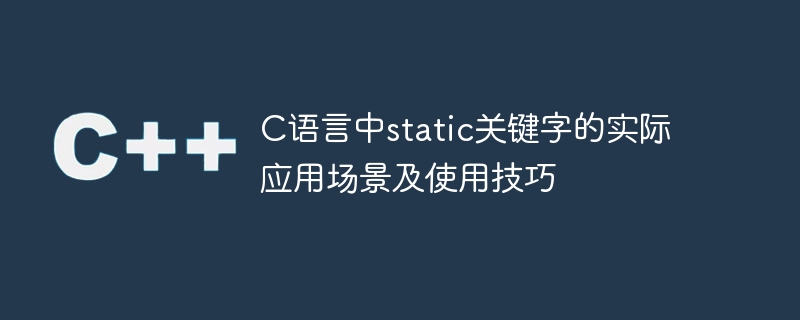Heim >Backend-Entwicklung >C++ >Praktische Anwendungsszenarien und Verwendungsfähigkeiten des statischen Schlüsselworts in der C-Sprache
Praktische Anwendungsszenarien und Verwendungsfähigkeiten des statischen Schlüsselworts in der C-Sprache
- 王林Original
- 2024-02-21 19:21:03842Durchsuche

Praktische Anwendungsszenarien und Verwendungsfähigkeiten des statischen Schlüsselworts in der C-Sprache
一、概述
static是C语言中的一个关键字,用于修饰变量和函数。它的作用是改变其在程序运行过程中的生命周期和可见性,使得变量和函数具有静态的特性。本文将介绍static关键字的实际应用场景及使用技巧,并通过具体的代码示例进行说明。
二、静态变量
- 延长变量的生命周期
使用static关键字修饰局部变量可以将其生命周期延长到整个程序的运行过程中。这意味着即使离开了变量所在的作用域,变量的值仍然保持不变。这种特性在需要保持变量状态的场景中非常有用。例如,在一个递归函数中,我们可以使用静态变量来记录函数的调用次数。
#include <stdio.h>
int recursive()
{
static int count = 0;
count++;
printf("当前递归次数:%d
", count);
if (count < 5)
{
recursive();
}
return count;
}
int main()
{
int result = recursive();
printf("递归结束,共计调用次数:%d
", result);
return 0;
}运行结果:
当前递归次数:1 当前递归次数:2 当前递归次数:3 当前递归次数:4 当前递归次数:5 递归结束,共计调用次数:5
可以看到,通过使用static关键字修饰count变量,变量的值在递归调用过程中得以保持,实现了递归次数的累计。
- 控制变量的可见性
使用static关键字修饰全局变量可以将其作用域限制在当前源文件中,避免在其他源文件中被访问到。这样一来,我们可以在不同的源文件中定义同名的静态变量,不会出现冲突的问题。这种特性在需要共享变量的同时又要保证变量作用范围的封闭性的场景中非常有用。
// file1.c
#include <stdio.h>
static int global = 10;
void printGlobal()
{
printf("file1.c中的global:%d
", global);
}// file2.c
#include <stdio.h>
static int global = 20;
void printGlobal()
{
printf("file2.c中的global:%d
", global);
}// main.c
#include <stdio.h>
extern void printGlobal();
int main()
{
printGlobal();
return 0;
}运行结果:
file1.c中的global:10
在这个例子中,由于global变量被static关键字修饰,所以在不同的源文件中可以定义同名的静态变量而不会引发冲突。
三、静态函数
- 控制函数的可见性
使用static关键字修饰函数可以将其作用域限制在当前源文件中,避免在其他源文件中被调用到。这样一来,我们可以在不同的源文件中定义同名的静态函数,不会出现冲突的问题。这种特性在需要封装函数实现的同时又不想暴露给其他模块的场景中非常有用。
// file1.c
#include <stdio.h>
static void privateFunc()
{
printf("这是file1.c中的私有函数
");
}
void publicFunc()
{
printf("这是file1.c中的公共函数
");
privateFunc();
}// file2.c
#include <stdio.h>
static void privateFunc()
{
printf("这是file2.c中的私有函数
");
}
void publicFunc()
{
printf("这是file2.c中的公共函数
");
privateFunc();
}// main.c
#include <stdio.h>
extern void publicFunc();
int main()
{
publicFunc();
return 0;
}运行结果:
这是file1.c中的公共函数 这是file1.c中的私有函数
在这个例子中,由于privateFunc函数被static关键字修饰,所以在不同的源文件中可以定义同名的静态函数而不会引发冲突。
- 函数只初始化一次
使用static关键字修饰局部变量可以使得该变量只被初始化一次,并且在函数的多次调用之间保持其值不变。这种特性在需要记录某个变量状态的场景中非常有用。例如,在一个函数中需要记录函数调用次数。
#include <stdio.h>
void printCount()
{
static int count = 0;
count++;
printf("函数调用次数:%d
", count);
}
int main()
{
int i;
for (i = 0; i < 5; i++)
{
printCount();
}
return 0;
}运行结果:
函数调用次数:1 函数调用次数:2 函数调用次数:3 函数调用次数:4 函数调用次数:5
可以看到,通过使用static关键字修饰count变量,变量的值在函数的多次调用之间得以保持,实现了函数调用次数的累计。
四、小结
本文介绍了Praktische Anwendungsszenarien und Verwendungsfähigkeiten des statischen Schlüsselworts in der C-Sprache。通过对静态变量和静态函数的示例进行详细说明,我们可以发现static关键字在延长变量生命周期、控制变量和函数的可见性以及控制变量初始化次数等方面,具有重要的作用。合理地应用static关键字可以提高程序的可读性、可维护性和安全性。希望本文对读者在C语言编程中的应用有所帮助。
Das obige ist der detaillierte Inhalt vonPraktische Anwendungsszenarien und Verwendungsfähigkeiten des statischen Schlüsselworts in der C-Sprache. Für weitere Informationen folgen Sie bitte anderen verwandten Artikeln auf der PHP chinesischen Website!

